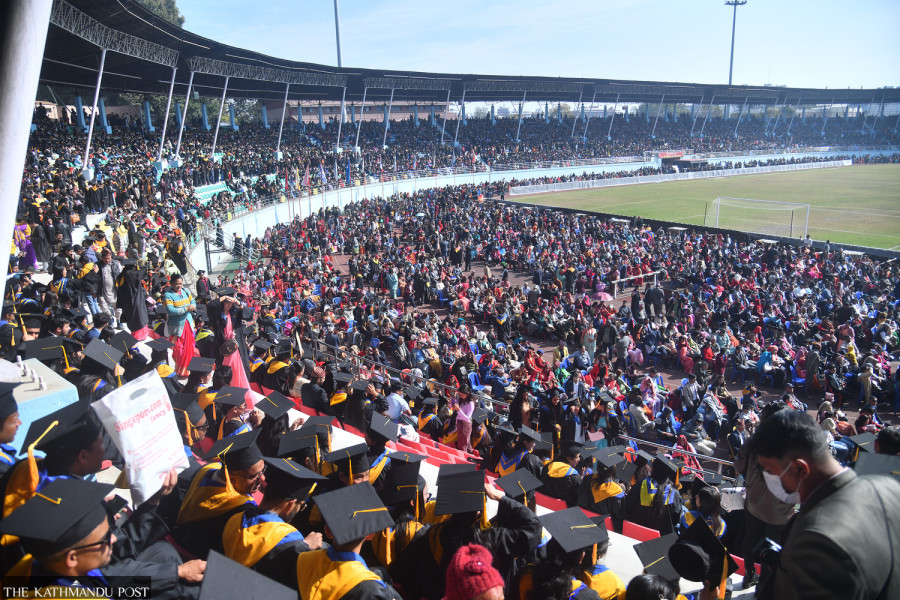Editorial
Big and ugly
The spectacle of thousands of TU graduates thronging the stadium inspired more mockery than hope.
On Monday, at the Dashrath Rangashala in Tripureshwor, there was a spectacle to behold. Students donning convocation gowns and hats, flanked by family and friends, filled the stands of the grand stadium—and spilled over into the football pitch. Students were seen running amok looking for the booths where they would get their graduation certificates from Tribhuvan University (TU). And at the end of the day, a section of the students went home empty-handed, as the authorities had misplaced the certificates. The graduates were visibly irritated, as so much of their time and energy that day had gone to waste. But they were not surprised. Rather, it was a final reminder of how slow, mismanaged, and irresponsible the university had been throughout their academic journey.
There was also something else occupying the university officials on the convocation day—the chase of a world record. Yes, TU made history by handing over degree certificates to 12,415 graduates. Technically, the number is much lower if we count the students who didn’t turn up or returned home empty-handed. Nonetheless, TU was recognised by the Official World Record (OWR) for organising a convocation with 26,000 attendees, apparently the biggest convocation attendance ever, anywhere in the world. What’s more, a total of 73,749 students were eligible for graduation. What a success story!
If only. Tales galore of frustration of the graduates who had a hard time completing their degrees: a missing academic calendar, endless delays, and a climate of fear as party-affiliated student politics took centre stage even as academics were pushed to the sides. Moreover, the new graduates will have little confidence in what their degrees will get them, considering the university’s low global standing, the country’s deteriorating job portfolio, and an increasingly competitive world where only a degree from a foreign university is considered a gateway to success. With almost 100,000 students obtaining a no-objection certificate to enrol in foreign universities, TU, the oldest and largest university in the country, is part of the institutions that have helped students imbibe the notion that Nepal is no country to stay.
Let us for a moment keep aside other things that frustrate the average Nepali youth today and focus on TU. The most glaring issue with the university is its sheer size: With a student size of nearly 500,000, it has for too long been too big and unmanageable—at least with the current political leadership that dictates its functioning and the politicised administration that manages its daily affairs. Its success story of the grandest graduation in quantitative terms is, therefore, the sad story of its failure in qualitative terms. From constituent campuses to the number of students, TU is too “bhuttey” to function well, to use a colloquial Nepali term. And, as Prime Minister Pushpa Kamal Dahal confessed in his speech at the stadium, the institution needs to be de-politicised. Coming from the prime minister, who is the chancellor of the university, the confession was on point. But will he translate his words into action and ensure that a new TU vice-chancellor is appointed on merit? That he would instruct his party’s student wings not to disrupt academics in pursuit of political goals? That he would take the initiative to have a cross-party understanding to help the university function as a centre of academic excellence rather than a platform for political rivalry? Unlikely, but we are happy to be proven wrong.




 9.89°C Kathmandu
9.89°C Kathmandu














